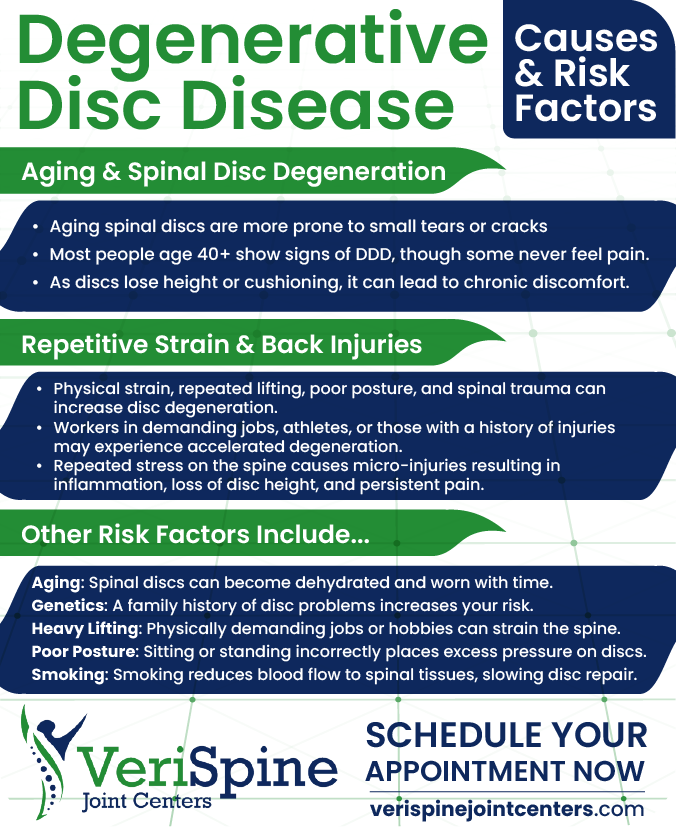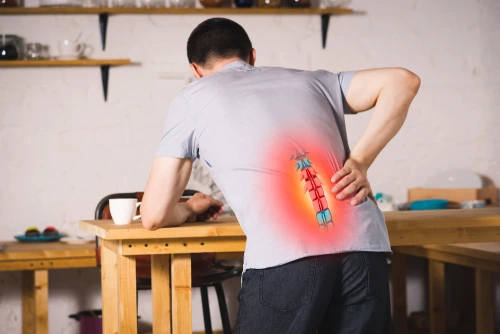Degenerative Disc Disease is one of the most common causes of chronic back pain, yet the name can be misleading. While it sounds like a progressive illness, it’s a natural part of aging that can affect the spinal discs over time. For many people, this condition leads to stiffness, discomfort, and reduced mobility, but the right treatment plan can make a world of difference.
At VeriSpine Joint Centers, we specialize in diagnosing and treating medical conditions like Degenerative Disc Disease with a compassionate and patient-centered approach. Whether your symptoms result from years of wear and tear, a work-related injury, or repetitive strain, our team is here to help you return to the activities you love without being held back by chronic pain.
What Is Degenerative Disc Disease (DDD)?
Degenerative Disc Disease (DDD) refers to the gradual breakdown of the discs between the vertebrae in your spine. These discs act like cushions or shock absorbers, helping you bend, twist, and move comfortably. As we age or experience repetitive stress, these discs can begin to wear down, lose hydration, or even tear, leading to pain, stiffness, and in some cases, nerve compression.
Although DDD is not technically a disease, but rather a condition that develops over time, it can significantly affect your quality of life. As the discs deteriorate, they may cause inflammation or instability in the spine. This can lead to symptoms such as low back pain, neck pain, numbness, tingling, or weakness in the arms or legs, depending on where the disc damage occurs.
Degenerative Disc Disease (DDD) can also contribute to other spinal conditions, such as:
- Osteoarthritis
- Spinal stenosis
- Spondylolysis
- Herniated discs
What Causes Degenerative Disc Disease?
The primary cause of Degenerative Disc Disease is the natural aging process. Over time, the spinal discs lose their water content, become less flexible, and begin to shrink. This can reduce the space between the vertebrae and put more pressure on nerves and joints. However, there are several contributing factors beyond aging that can accelerate disc degeneration or worsen symptoms.
Aging and Spinal Disc Degeneration
As you get older, your spinal discs naturally undergo changes. They may become thinner, less elastic, and more prone to small tears or cracks. These changes reduce the discs’ ability to cushion the spine effectively. Most people over the age of 40 show some signs of disc degeneration, but not everyone experiences pain. When the discs lose too much height or cushioning, it can lead to instability and chronic discomfort.
Repetitive Strain and Back Injuries
Physical strain, repeated lifting, poor posture, and trauma to the spine can all increase wear and tear on the discs. Workers in physically demanding jobs, athletes, or those with a history of back injuries may experience faster progression of DDD. Repeated stress on the spine causes micro-injuries to the discs that accumulate over time, resulting in inflammation, loss of disc height, and pain that doesn’t always go away with rest.
Understanding Risk Factors
While aging is the most common cause, several risk factors can contribute to the development or progression of Degenerative Disc Disease. These factors can weaken spinal structures and make you more susceptible to chronic back issues.
Common risk factors include:
- Aging: Spinal discs can become dehydrated and worn with time.
- Genetics: A family history of disc problems increases your risk.
- Heavy lifting: Physically demanding jobs or hobbies can strain the spine.
- Poor posture: Sitting or standing incorrectly places excess pressure on discs.
- Smoking reduces blood supply to spinal tissues, slowing healing and disc repair.
How Is Degenerative Disc Disease Diagnosed?
At VeriSpine Joint Centers, diagnosing Degenerative Disc Disease begins with a detailed conversation about your symptoms, lifestyle, and medical history. Our physicians will conduct a thorough physical exam to check for areas of pain, weakness, numbness, or restricted movement. Understanding the pattern and location of your discomfort helps us determine if a degenerating disc is the likely cause.
Diagnostic imaging plays a critical role in confirming the diagnosis. We use advanced tools like MRI (magnetic resonance imaging) and X-rays to get a clear view of the spine. These images can show disc height, alignment, and signs of disc wear or herniation. In some cases, additional tests like CT scans or discography may be used to assess the integrity of the disc or rule out other conditions.
Degenerative Disc Disease Treatment
Treating Degenerative Disc Disease depends on the severity of your symptoms and how the condition affects your daily life. While not every case requires aggressive intervention, many patients benefit from a combination of conservative and minimally invasive therapies. At VeriSpine Joint Centers, our specialists design personalized treatment plans focused on long-term pain relief, spinal stability, and improved mobility.
Our comprehensive care includes non-surgical approaches such as physical therapy and injections. For patients who do not respond to conservative care, we also offer advanced minimally invasive pain relief procedures.
Physical Therapy
Physical therapy is one of the most effective treatments for Degenerative Disc Disease. A targeted rehabilitation program helps strengthen the muscles that support your spine, enhance flexibility, and correct poor movement patterns that contribute to disc stress.
Our physical therapists will develop a custom exercise plan based on your diagnosis and current level of function. Therapy may begin with gentle stretching, posture correction, and core stabilization exercises. As strength improves, more advanced activities are introduced to support daily tasks and prevent further degeneration.
Our physiotherapy programs may also include treatments such as:
- Chiropractic care to alleviate pain and restore alignment
- Massage to reduce muscle soreness and improve circulation
- Microcurrent therapy (low-level electrical stimulation) to stimulate healing
Steroid Injections
When inflammation around a degenerated disc causes severe pain, especially if a nearby nerve is compressed, epidural steroid injections can provide targeted relief. This procedure involves injecting a corticosteroid and anesthetic into the space around the irritated nerve to reduce inflammation and numb the area.
Radiofrequency Ablation
Radiofrequency ablation (RFA) is a minimally invasive procedure that targets the nerves responsible for transmitting pain signals from the spine. Using heat generated by radio waves, RFA disables specific nerves near the affected discs, interrupting the pain cycle.
This outpatient procedure is ideal for patients with chronic facet joint pain caused by disc degeneration. RFA can provide relief lasting six months or longer, giving patients the opportunity to stay active and avoid surgery.
At VeriSpine Joint Centers, our pain management specialists perform RFA with precision and care, ensuring each patient is a good candidate and thoroughly supported during recovery.
Minimally Invasive Surgery (Endoscopic Discectomy)
For patients whose symptoms do not improve with conservative treatments, minimally invasive spinal surgery may be necessary. One option is an endoscopic discectomy, a procedure that removes damaged disc material pressing on nerves without requiring large incisions or a lengthy recovery.
This technique uses a small camera and surgical tools inserted through a tiny incision, allowing the surgeon to visualize and treat the problem with minimal disruption to surrounding tissue. Benefits of minimally invasive surgery include less post-operative pain, quicker recovery, and a lower risk of complications compared to traditional open surgery.
VeriSpine Joint Centers partners with skilled spinal surgeons to offer state-of-the-art techniques for long-term relief when all other options have been exhausted.
Why Choose Our Spine Pain Specialists?
At VeriSpine Joint Centers, we are dedicated to providing outstanding treatment for Degenerative Disc Disease. Our team has years of experience in pain management, physical medicine, rehabilitation, and injury recovery. Our doctors and specialists take the time to listen, understand your symptoms, and create a care plan tailored to your unique needs.
We have extensive experience assisting with personal injury, workers’ compensation, and federal workers’ compensation (OWCP) claims. We can refer you to seasoned lawyers and provide documentation for your case.
Contact VeriSpine Joint Centers Today
Chronic back pain from Degenerative Disc Disease doesn’t have to control your life. At VeriSpine Joint Centers, we understand how disruptive spinal conditions can be. With extensive experience treating back and neck disorders, our compassionate team is committed to helping you find relief and get back to doing what you love.
Whether you’re just beginning to explore treatment options or have been struggling with pain for years, we’re ready to support you every step of the way. Don’t let disc degeneration slow you down. Contact us today to schedule a consultation and take the first step toward a healthier, more active future.



